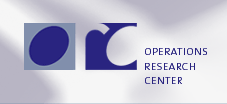|
|
 |
 |
Fall 2015 Seminar Series
MASSACHUSETTS INSTITUTE OF TECHNOLOGY
OPERATIONS RESEARCH CENTER
FALL 2015 SEMINAR SERIES
DATE: 10/1/2015
LOCATION: E51-315
TIME: 4:15pm
Reception immediately following
TITLE
Revenue-Maximizing Dynamic Tolls
ABSTRACT
So-called public/private partnerships in which a private company builds infrastructure in return for a claim on future revenue have become increasingly popular. One example are highways in which private companies build additional lanes on existing freeways in return for the right to charge tolls on those lanes and keep the resulting revenue. We consider the problem that the toll lane operator faces of dynamically setting and updating tolls on a set of managed lanes to maximize revenue in the case in which drivers always have a free alternative available. This research was based on the participation of the author in the design and development of the dynamic tolling algorithm for the new North Tarrant Expressway and LBJ Freeway projects in Texas.
We first consider a simplified version of the problem in which the competing lanes are modeled as queues in order to derive some structural results. We then compare policies using a stochastic simulation that uses standard models to represent the evolution of traffic for both managed and unmanaged lanes combined with a consumer choice model to represent how incoming vehicles choose between alternatives based on the current toll and on the current congestion in both the managed and unmanaged lanes. A key driver of the results is the fact that tolls on the managed lanes create an externality in that increased tolls on the managed lanes will increase traffic and hence congestion on the unmanaged lanes. One result is that revenue-maximizing tolls are always higher than the myopic tolls that maximize expected revenue from each arriving vehicle. Another key result is that policies that anticipate future arrival patterns strongly outperform policies that consider only the current state in setting tolls.
This is joint work with Caner Göçmen and Garrett van Ryzin.
|
 |
 |
 |
|


